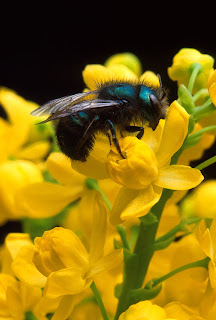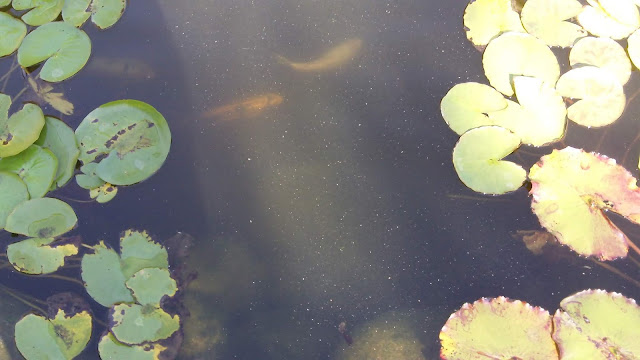Bee-lieve it or not...
You know how important bees are. You know that honey bee populations are dwindling because of pesticides. I'm not here to dwell on the bad news -- we get enough of that whenever we turn on the TV, flip through Facebook, or even talk to our neighbors!
Let's hear some good news.
Have you ever heard of a mason bee? They're small, solitary bees that are native to North America. There's a big buzz about mason bees in the gardening and wildlife-loving community, and for good reasons!
Mason bees are incredible pollinators, even more effective than non-native honey bees. They're also friendly (no need to worry about being stung by these little cuties!). And because they are solitary, they are not as susceptible to colony collapse disorder, making them our little pollinating heroes.
What can you do for mason bees?
Mason bees come out of hibernation much earlier than their larger, bumbling counterparts. Mason bees are active in very early spring. In fact I've already spotted them flitting around my spring-blossoming flowers!
These little bees need the same habitat requirements as any other critter: food, water, and shelter.
Feed them beautiful, early-blooming plants!
Plants like phlox, crab apple trees, service berry shrubs, and iris bloom in early spring-time. Don't forget your later-rising pollinators, like other bees, hummingbirds, and butterflies! Provide blooming plants all season long. I know-- having blooming plants around from spring until fall? What a bummer, right?
As for the water part-- as pond / pondless / container gardeners, you've got this all figured out. Bees love slow-moving, shallow water.
Now you just need a little shelter. This insect hotel is a great option for lots of garden-benefiting critters. Mason bees need round tubes they can nest in-- somewhere a few feet off the ground where they can get at least 4 hours of sunlight.
So plant some blooming plants and help save the world!
Let's hear some good news.
Have you ever heard of a mason bee? They're small, solitary bees that are native to North America. There's a big buzz about mason bees in the gardening and wildlife-loving community, and for good reasons!
 |
| Just one of the many species of mason bees. Look how cute he is! |
Mason bees are incredible pollinators, even more effective than non-native honey bees. They're also friendly (no need to worry about being stung by these little cuties!). And because they are solitary, they are not as susceptible to colony collapse disorder, making them our little pollinating heroes.
What can you do for mason bees?
Mason bees come out of hibernation much earlier than their larger, bumbling counterparts. Mason bees are active in very early spring. In fact I've already spotted them flitting around my spring-blossoming flowers!
These little bees need the same habitat requirements as any other critter: food, water, and shelter.
Feed them beautiful, early-blooming plants!
Plants like phlox, crab apple trees, service berry shrubs, and iris bloom in early spring-time. Don't forget your later-rising pollinators, like other bees, hummingbirds, and butterflies! Provide blooming plants all season long. I know-- having blooming plants around from spring until fall? What a bummer, right?
 |
| This bee is enjoying aquatic forget-me-not-- a Cool Ponds favorite! |
As for the water part-- as pond / pondless / container gardeners, you've got this all figured out. Bees love slow-moving, shallow water.
 |
| The center part of this "insect hotel" is perfect for mason bees! |
Now you just need a little shelter. This insect hotel is a great option for lots of garden-benefiting critters. Mason bees need round tubes they can nest in-- somewhere a few feet off the ground where they can get at least 4 hours of sunlight.
So plant some blooming plants and help save the world!


Comments